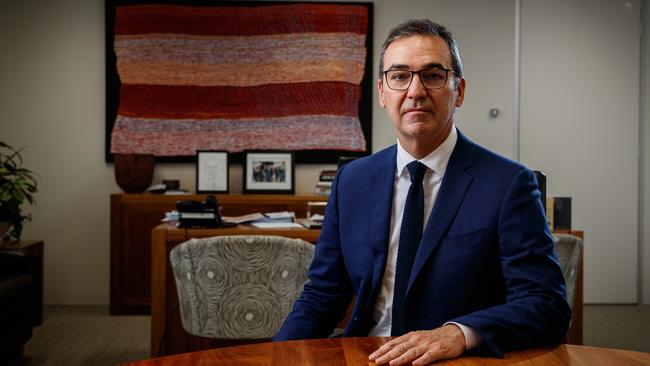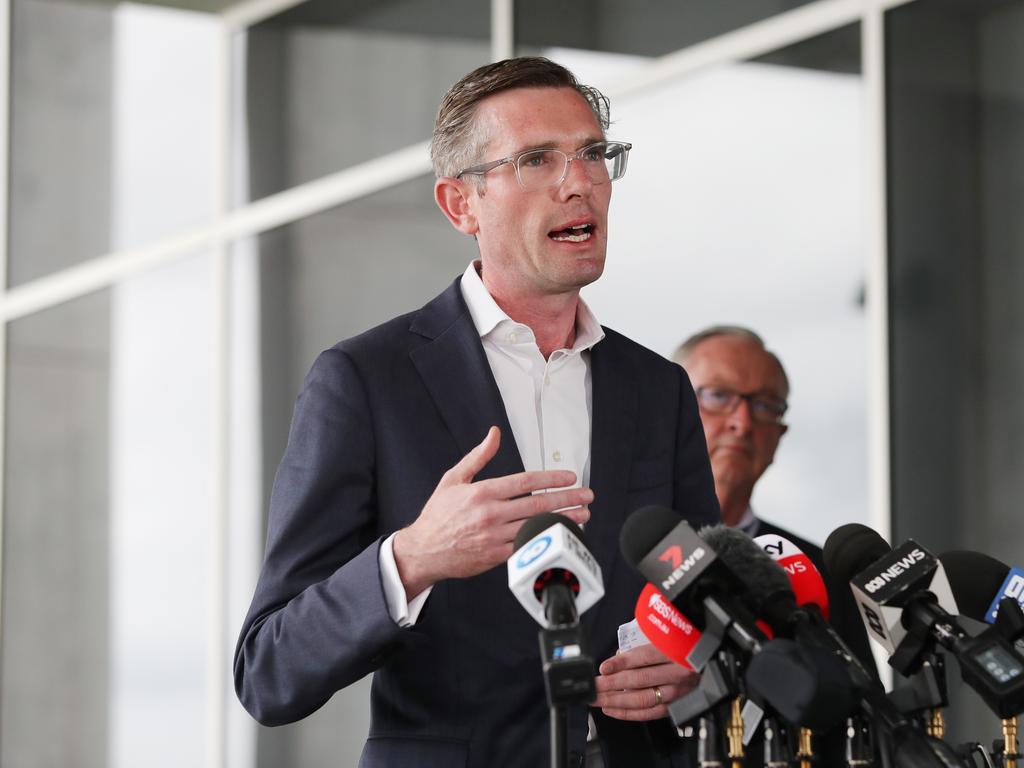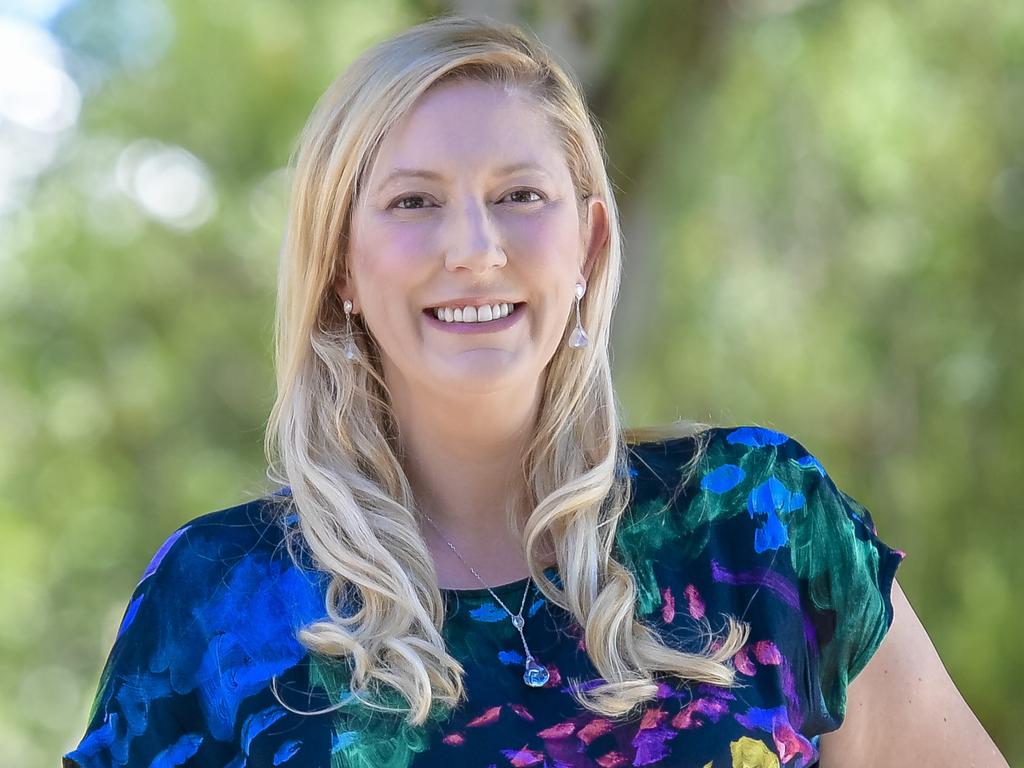Marshall makes ‘rags-to-riches’ pitch for re-election in South Australia, despite internal dramas
Steven Marshall’s pre-election pitch is a rustbelt-to-riches story where South Australia has gone from a mendicant state to a private sector-driven economy.

Steven Marshall’s pre-election pitch is a rustbelt-to-riches story where South Australia has gone from a mendicant state with a seemingly irreversible brain drain to a private sector-driven economy that’s attracting people like never before.
Yet his campaign pitch is being muddied by the Omicron surge, which started one day after SA reopened its borders on November 23, prompting tens of thousands of new cases and more than 80 deaths in a state that had previously coasted through Covid with four lives lost.
Seven weeks out from seeking a second term, Marshall told The Australian that while he was happy to run on his record managing Covid, he would use the campaign to shift the narrative on to the “complete turnaround” in the economic perception and reality of SA.
Marshall says the days of luring business to SA with handouts was “over” and his government had shown the state could prosper on its merits by lowering taxes, reducing costs and tapping into Adelaide’s now-recognised status as one of the world’s most liveable cities.
“We have a great economic story to tell,” he says. “Previously the only people who were coming to South Australia were people highly subsidised by the former government. That’s the only way we got them here. And what a way to do it – to go out there and say: ‘Well, we’re not very competitive, so we are effectively going to have to pay you to come.’
“That was the former government’s approach to business attraction. We are the total opposite. We’ve lowered taxes, removed regulation, set strategic plans by sector for our growth state strategy.
“We have got net migration to SA for the first time in 40 years. Forty years. Under Labor, we had a mass exodus of young people and capital. We have turned both of those things around.”
Omicron explosion
After 16 years of Labor rule, Marshall led the Liberals to victory in 2018 and will seek what should have been an easy second-term victory when SA goes to the polls on March 19.
But the past six months were messy for Marshall, with the SA Liberals plunged deeper into minority government, plagued by a resurgence of internal brawling and a conflict of interest scandal that forced deputy premier Vickie Chapman aside.
Beyond that, Marshall faced sustained business criticism that he had ceded too much authority to health bureaucrats and police in managing Covid.
More ominously on election eve, this summer has seen fierce public debate over the wisdom of the SA border reopening on November 23 and the preparedness of SA Health to deal with the sudden influx of cases from the east.
In the lead-up to Christmas, SA went from being a Covid-free state to seeing Omicron explode.
As of Sunday, 110 people had died and there had been almost 104,000 cases, most clocked up since the borders opened.
Many families spent Christmas and holidays apart from loved ones from strict isolation rules for close contacts, and thousands of people waiting as long as 10 hours at swamped testing stations, the opposition labelling Marshall the man who “ruined Christmas” by failing to prepare for an inevitable surge.
Marshall insists SA had no choice but to open on November 23 in line with its vaccination targets, noting at the time people were pleading for a compassionate approach so families could be reunited and Omicron had not been declared a variant of concern. “It’s obviously been a very different start to the year but I am very hopeful we are that point of the peak and that we can come down from this Omicron peak as soon as possible,” he says.
“Omicron was brand new to the entire world and it only got reported to the WHO on November 24 after we opened our borders.
“The entire world has been trying to grapple with what Omicron is all about. I think our systems in SA have stood up extraordinarily well.
“The issues we see in SA with testing and tracing are the same issues they’re dealing with in Sydney, Melbourne, London, Hong Kong. I still believe unequivocally that this is one of the very best places to be living during the Omicron outbreak.”
Business criticism
Marshall is 53 and a late-comer to politics, entering parliament in 2010 after running his family’s furniture manufacturing business and setting up a successful chain of take-away Asian restaurants called Wok in a Box.
He is aware of business criticism of his Covid management but says it varied from sector to sector, with industries such as tourism, the arts and hospitality having been belted, but others making money like never before.
Marshall also believes that some of the criticism, particularly from traditional Liberal supporters, is “ideological”, reflecting a conviction that government should always remain small and the bureaucracy should exert no control over anything, even in the midst of a worldwide pandemic.
He urges his detractors to reflect on how SA fared with Covid versus the other states, with the fewest days in lockdown and (for the most part) the most liberal social distancing rules outside of WA, without adopting the fortress mentality of Mark McGowan.
“Obviously people are fiercely advocating for their sectors but ultimately we charted a course that delivered for SA the strongest economic growth of any state in the nation,” he says. “Some states significantly relaxed restrictions and ended up back in lockdown. I think we got the balance right.”
Sensible approach
Marshall denies he ceded power but rather drew on his business background in treating the pandemic as a logistical challenge requiring a round-table approach with police commissioner Grant Stevens and chief medical officer Professor Nicola Spurrier.
“Many of the things I learnt in manufacturing and running companies have served me well in this period,” he says.
“A lot of what we had to do involved forecasting and capacity planning for health resources – it is stock in trade for someone who comes from the manufacturing industry.
“I think we have taken a sensible approach to dealing with a global pandemic. We have been prudent, but ultimately the protections we put in place have delivered the strongest economy in the entire nation. We have been able to keep out state safe and our economy strong.”
The data-obsessed Marshall says the benefits of this approach are underscored by the ABS stats, with the state’s economy growing 1.3 per cent annually over the past three years against a national average of 1.2 per cent, versus an annual growth rate of 1.1 per cent in Labor’s final seven years of office when the national economy grew 2.7 per cent annually.
And he says even with the impact of Covid, SA’s gross state product rose 3.9 per cent in 2020-21, the highest growth rate of all states and territories.
Marshall points to the roll-call of major companies that have set up shop in SA over the past three years that are helping to shift the state’s reliance on agriculture, defence and manufacturing into emerging tech and creative industries.
In the past three years, more than 5000 high-tech jobs have been created, with the global management consulting and technology services firm Accenture setting up a 2000-person office and global systems integrator Cognizant a 1600-strong tech hub. Others to move or expand into SA include MTX Group, Deloitte, Amazon, PWC and Google.
“Our performance in terms of Covid has given us a perfect opportunity to showcase SA to companies and individuals who have never considered moving here in the past,” Marshall says.
“We have now been identified as the most liveable city in Australia and the third most liveable in the world.
“More than that, we are the safest state in the safest continent on earth.
“We are now seeing Adelaide and more broadly SA as a magnet for some of the world’s largest companies.”
It is a message Marshall puts frequently to a business community that has become jaded by the 18-month impact of Covid, and a partyroom that has become distracted by internal tensions and personality politics.
Internal woes
The moderate Marshall leads a moderate-dominated government. Things came to a head this term amid concerns over his former deputy and attorney-general Chapman’s championing of social issues such as euthanasia and late-term abortion, along with broader Covid-related gripes from country MPs and conservatives over what they call Marshall’s “hands-off” management of the pandemic.
“The problem Steven has is that a lot of these things could have been managed internally if he wasn’t so remote and actually listened to his own people,” one MP tells The Australian.
The internal woes deepened in October when Adelaide Hills MP Dan Cregan quit the party in October in a two-pronged attack. Not only did he rob Marshall’s minority government of another seat, he sided with Labor to force a damaging inquiry into Chapman’s non-disclosure in parliament of her ownership of a Kangaroo Island investment property, where earlier this year she vetoed a deep sea port in her capacity as planning minister.
While Opposition Leader Peter Malinauskas led the charge against Chapman, Marshall believes his opponent is wasting his time. “There is always politics in the parliament but my focus has unequivocally and unashamedly been on keeping our state safe and growing our economy,” he says.
“The average person in the street is not too concerned about politics. They are concerned with their family being safe and their jobs being in place.”
Marshall says he is still holding open the prospect of a full return to cabinet by his close friend Chapman pending an inquiry into her conduct by the state’s Ombudsman.
“We will have to wait and see what the ombudsman discovers but I am adamant that she made the right decision. It’s exactly the decision I would have made. I back her 100 per cent.”
Best outcomes
Marshall’s close friend and moderate ally, former defence minister Christopher Pyne, nominates tackling the brain drain as one of the Marshall government’s key achievements.
Like many university graduates in SA from the 1990s, Pyne bid farewell to a string of educated friends to the eastern states as SA’s young middle class decamped after the Bannon Labor government presided over the $3.1bn State Bank collapse in 1993.
“Marshall has presided over a renaissance in the state’s economy,” Pyne tells The Australian.
“He’s reversed the brain drain, SA has the highest growth in the nation, there are more jobs than before the pandemic, cranes dominate the Adelaide skyline like a steel forest and The Economist scored our health system 100/100.
“When was the last time we could say that?” he says.
“While Covid has damaged everyone’s confidence, SA has had arguably the best outcomes in the country. He’s struck a balance between opening up and staying safe.
“Labor hasn’t had long enough out of office to learn why they lost. They need new ideas and new personnel. If they win in March, it will be a return to business as usual.
“That’s not healthy for our democracy.
“If Labor is returned so soon, they will be like the returning Bourbon kings of France, of whom it was said in 1814 ‘They have learned nothing and forgotten nothing.’ ”
Pyne is right to raise the prospect of a shock Labor win as the polls show Marshall does not have the election in the bag.
He’s up against a presentable and conservative Opposition Leader in a state with a proportionally high number of public servants, and an imbalance between the large number of Labor-friendly poorer suburban seats and a small amount of pro-conservative rural seats.
In the event he does fall short, Scott Morrison will lose one of his few state allies, who has provided him with not one headache throughout Covid as national cabinet has leaked like a sieve and other premiers have postured and taken potshots at the Prime Minister.
Morrison’s affection for Marshall is such that he even revealed at an SA Liberal event this year that he nicknamed him “quokka”, because he is always happy.
“He has certainly never called me quokka to my face,” Marshall says.
“But I have a great working relationship with Scott. We genuinely get along well.
“I’ve never had a situation where I have called him and he hasn’t got back to me straight away. “I see him in action as chair of national cabinet on a very regular basis. He has the ability to steer the conversation in valuable directions and deliver the best outcomes for the country.
“Like me, he wanted to see SA get up off the mat after 16 years of Labor. I want to keep working with him as Premier.”






To join the conversation, please log in. Don't have an account? Register
Join the conversation, you are commenting as Logout